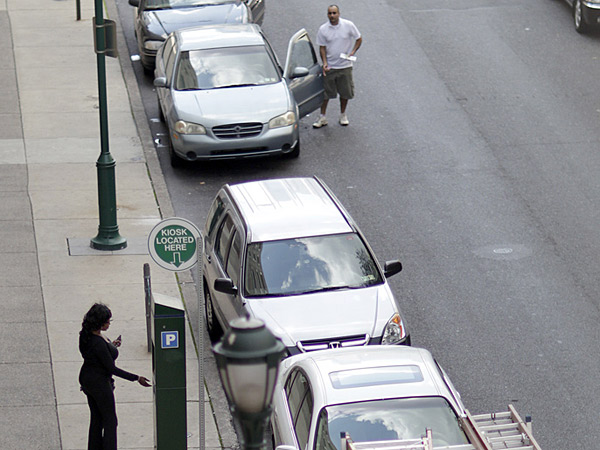11/14/2014
They can then bid in increments of $5 on how much they will pay for the spot. The users are charged only if they park successfully. Drivers vacating spots can sell to the highest bidder.
The city's concern: What happens to people rounding the block the old-fashioned way who think they've found something?
"If people start renting spots, people can get angry," Greenlee said. "We thought we were way ahead of the curve, but we understand this has already popped up."
During the meeting, an app showed six spots available near City Hall, though none of the users who posted the spots accepted a $20 bid.
Andrew Stober, chief of staff in the Mayor's Office of Transportation, said the city can't, in most cases, provide more curb space so it must protect the parking it has.
"When a driver pulls into a parking spot, they borrow that spot from the community," he said.
These apps, he noted, could cause friction or even violence as they "would frustrate the drivers who might believe a parking spot is available only to be told the space is reserved," Stober said.
Richard Dickson, deputy executive director of the Philadelphia Parking Authority, testified that parking should not be an "insider's game."
PPA is fighting another app firm, Uber, which connects taxi users with vehicle owners looking to make a few extra dollars by giving people rides for a fee.
If the parking bill, now headed to the full Council, is approved, police would be able to cite offenders, either in person or by leaving a ticket on their vehicles. The fine would be $250 per violation.
Offenders would be those caught reserving or selling spots.
Greenlee said he was confident the law could be enforced by authorities keeping tabs on the applications and recording complaints. "I think word will get around that this is being watched. Once they see the city is on this, I think it'll cut down dramatically," he said. "Public streets should be open to whoever finds them first."
In June, San Francisco's city attorney issued a cease-and-desist demand to Monkey Parking and asked tech giant Apple to remove the application from its app store.
source
File: A customer uses a PPA parking kiosk on the 900 block of Filbert Street in Philadelphia. (David Maialetti / Staff Photographer)
Phone apps that give heightened meaning to the phrase "prized parking space" are about to face pushback from the city.
City Council's Streets and Services Committee on Wednesday advanced a bill aimed at shutting down phone apps that allow drivers to bid on and sell public parking spots.
The bill amends the city's parking regulations to make it illegal to sell, lease, or reserve public parking spots.
Boston, San Francisco, and Los Angeles have introduced or passed similar ordinances after apps such as Monkey Parking and Haystack started becoming popular in those cities, said Councilman William Greenlee, who sponsored the bill.
Monkey Parking, a company based in Italy, allows users to plug in the location where they want to find parking and see available spots posted by other users getting ready to leave.City Council's Streets and Services Committee on Wednesday advanced a bill aimed at shutting down phone apps that allow drivers to bid on and sell public parking spots.
The bill amends the city's parking regulations to make it illegal to sell, lease, or reserve public parking spots.
Boston, San Francisco, and Los Angeles have introduced or passed similar ordinances after apps such as Monkey Parking and Haystack started becoming popular in those cities, said Councilman William Greenlee, who sponsored the bill.
They can then bid in increments of $5 on how much they will pay for the spot. The users are charged only if they park successfully. Drivers vacating spots can sell to the highest bidder.
The city's concern: What happens to people rounding the block the old-fashioned way who think they've found something?
"If people start renting spots, people can get angry," Greenlee said. "We thought we were way ahead of the curve, but we understand this has already popped up."
During the meeting, an app showed six spots available near City Hall, though none of the users who posted the spots accepted a $20 bid.
Andrew Stober, chief of staff in the Mayor's Office of Transportation, said the city can't, in most cases, provide more curb space so it must protect the parking it has.
"When a driver pulls into a parking spot, they borrow that spot from the community," he said.
These apps, he noted, could cause friction or even violence as they "would frustrate the drivers who might believe a parking spot is available only to be told the space is reserved," Stober said.
Richard Dickson, deputy executive director of the Philadelphia Parking Authority, testified that parking should not be an "insider's game."
PPA is fighting another app firm, Uber, which connects taxi users with vehicle owners looking to make a few extra dollars by giving people rides for a fee.
If the parking bill, now headed to the full Council, is approved, police would be able to cite offenders, either in person or by leaving a ticket on their vehicles. The fine would be $250 per violation.
Offenders would be those caught reserving or selling spots.
Greenlee said he was confident the law could be enforced by authorities keeping tabs on the applications and recording complaints. "I think word will get around that this is being watched. Once they see the city is on this, I think it'll cut down dramatically," he said. "Public streets should be open to whoever finds them first."
In June, San Francisco's city attorney issued a cease-and-desist demand to Monkey Parking and asked tech giant Apple to remove the application from its app store.
source

No comments:
Post a Comment